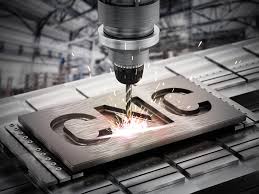The Craftsmanship Behind CNC Machining: Precision, Tools, and Techniques
Introduction to CNC Machining
Computer Numerical Control (CNC) machining is a pivotal technology in modern manufacturing, driving consistency and precision across various industries. This advanced machining process employs computer code to manage and control machinery, enabling the production of highly intricate parts with unparalleled detail and accuracy.
A critical aspect of this technology is using essential components like the CNC collet. Collets are vital for seamlessly holding and positioning the workpiece or tool during machining, ensuring each cut and motion is executed as planned. Their functionality addresses the need for consistency and repeatability, which are fundamental to mass production and custom manufacturing.
Essential Tools for CNC Machining
The competitiveness in CNC machining stems from carefully selecting tools suited to specific materials and machining processes. Cutting tools, drills, and end mills are tailored to slice through metals, plastics, and even wood with varying precision, depending on the desired outcome.
The inherent quality of the components produced is heavily influenced by the tool selection, reflecting the speed of operation and finish quality. Such knowledge is indispensable for achieving operational efficiencies and upholding product standards.
Understanding CNC Collets
Collets play an unsung yet crucial role in CNC machining. Precision tools designed to hold the workpiece or cutting tool in place deliver a significant degree of accuracy imperative for successful machining operations. The design and construction of a collet accommodate various tool sizes and kinds, thus providing flexibility and control within the machining process.
The choice of collets, whether ER collets, 5C collets, or others, depends on specific machining needs and the characteristics of the workpiece. A comprehensive understanding of these CNC collets ensures optimal performance and extends both the tool and machine’s longevity, preventing unnecessary wear and tear.
Precision in CNC Operations
Precision in CNC operations transcends beyond mere aesthetic appeal; it forms the foundation of functional fidelity and performance of machined parts. Maintaining stringent tolerances allows manufacturers to produce components that meet exact specifications, crucial in aerospace, automotive, and medical device manufacturing.
Enhancing precision involves deploying a meticulous approach to tool selection and machine maintenance. Regular calibration and preventive maintenance ensure the machinery operates at peak efficiency, reducing deviations and ensuring repeatability. This meticulousness defines and differentiates high-quality machining shops in an increasingly competitive industry.
Balancing Efficiency and Accuracy
The interplay between efficiency and accuracy in CNC machining presents a complex and ongoing challenge. Achieving the right balance between these two critical elements is essential, as an excessive emphasis on one can often undermine the other. On one hand, efficient production thrives on speed and high throughput, enabling manufacturers to meet demanding schedules. Conversely, precision is crucial; it necessitates careful attention to detail and frequently entails slower, more intentional processes to guarantee that every machined part adheres to exact specifications.
Navigating this delicate balance demands a thoughtful approach, including strategic planning and integrating advanced machining techniques. For instance, optimizing cutting paths can reduce unnecessary movements and enhance workflow, while carefully managing spindle speeds can help accommodate varying material properties without compromising the outcome. Implementing adaptive feed control allows for real-time adjustments based on machining conditions, ensuring that quality is maintained as production speeds increase.
Additionally, allocating resources for hands-on training for operators and promoting a culture of ongoing enhancement are essential strategies that aid in attaining this balance. These initiatives boost productivity and guarantee accuracy, resulting in higher-quality machined components. Combined, these methods foster a setting in which efficiency and precision thrive, propelling success in the competitive arena of CNC machining.
Advances in CNC Technology
CNC technology is undergoing a remarkable transformation, constantly evolving with cutting-edge innovations that significantly enhance efficiency and versatility within the manufacturing industry. Integrating artificial intelligence (AI) and machine learning into CNC systems marks a groundbreaking shift in traditional operational methods. These technologies empower manufacturers to implement predictive maintenance, allowing for the early detection of potential issues before they escalate, leading to less unplanned downtime. Additionally, AI facilitates meticulous process planning and supports advanced quality control measures, ensuring that every product meets the highest standards.
Moreover, the rise of emerging technologies, particularly IoT-enabled intelligent machines, is ushering in a new era of real-time monitoring and remote troubleshooting capabilities. These intelligent systems provide manufacturers with immediate insights into their operations, enabling them to address any issues swiftly. Consequently, downtime is greatly diminished, and there is a noticeable enhancement in resource use, rendering production processes more efficient and economical than ever.
Real-World Applications of CNC Machining
CNC machining has impacted numerous industries significantly due to its capability to produce complex designs with accurate tolerances. Aerospace sectors rely heavily on CNC machining to manufacture engine components and structural parts that require precision and reliability.
CNC machines craft engine blocks, transmission parts, and custom components in the automotive industry. Similarly, the electronics sector benefits from CNC’s precision in producing circuit boards and enclosures. These examples underscore the transformative power of CNC machining in enabling scalable, high-quality production across various disciplines.
Conclusion: The Future of CNC Machining
The future of CNC machining is poised for remarkable growth and transformation, driven by rapid technological advancements and evolving industrial needs. Incorporating automation, advanced intelligent manufacturing technologies, and sustainable practices is expected to influence the future of CNC operations, fostering a more efficient and eco-friendly setting.
Manufacturers who proactively adopt these emerging trends and seamlessly incorporate innovative technologies into their workflows will unlock significant benefits. They will experience enhanced efficiencies, greater accuracy, and the ability to deliver high-quality products consistently. Coupled with a steadfast dedication to precision and excellence, this forward-thinking approach will secure CNC machining’s position as an essential pillar of modern industrial manufacturing, ensuring it thrives in a competitive landscape.
Keep an eye for more news & updates on GlamourUer!






